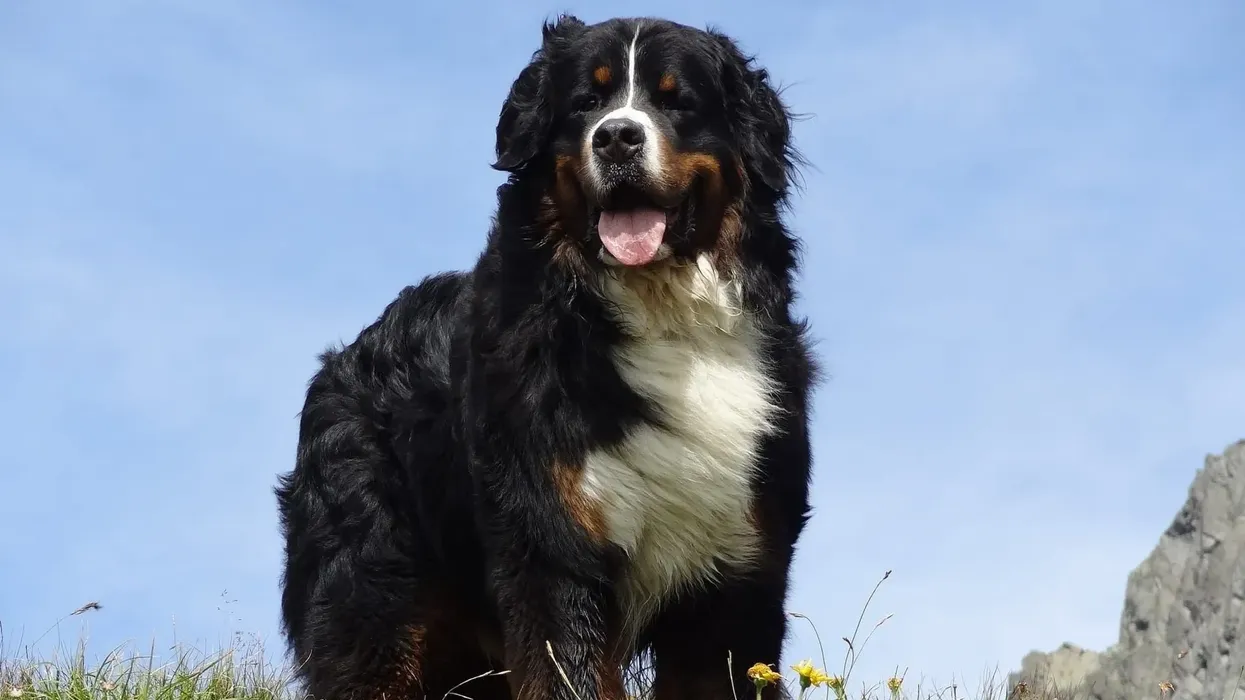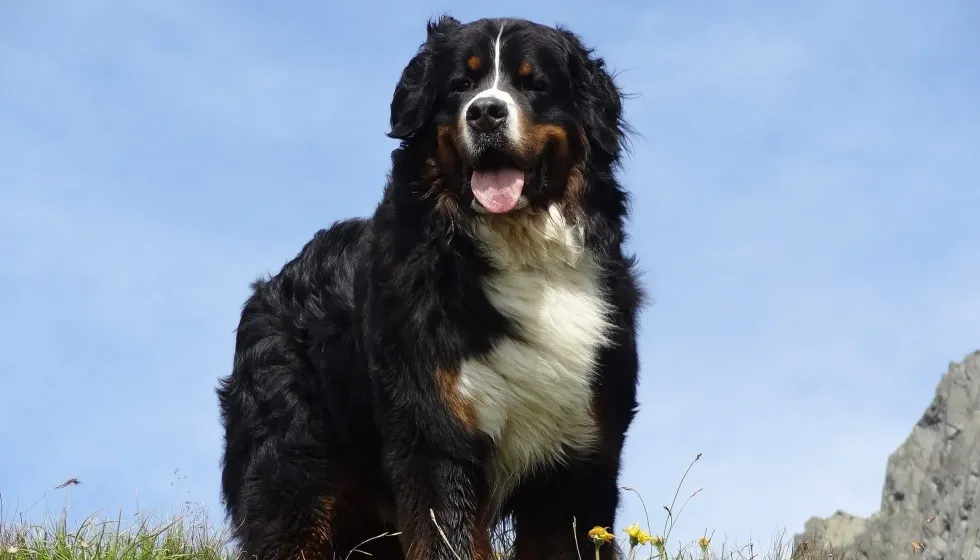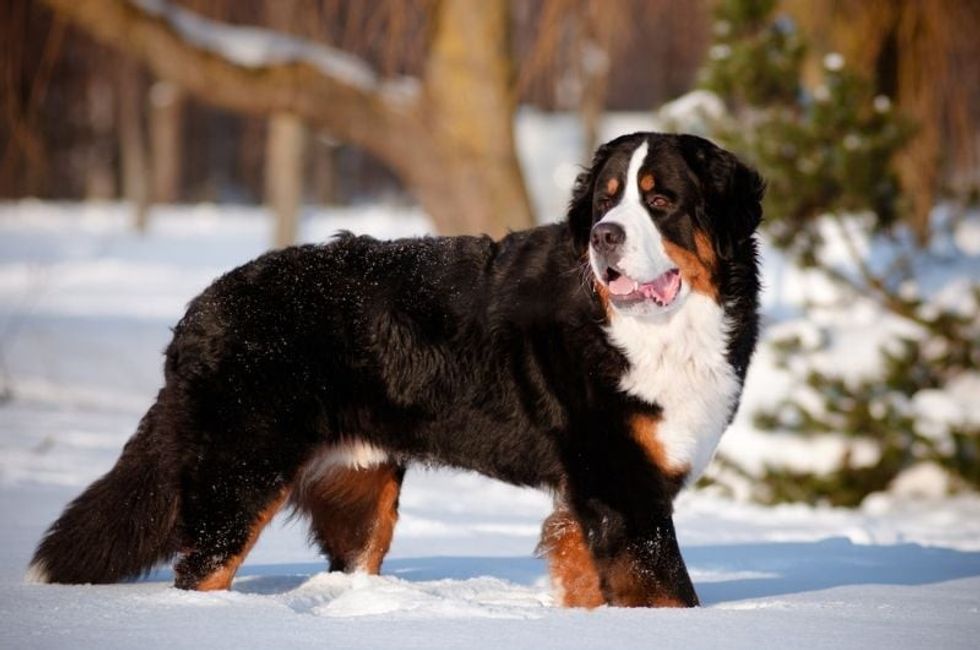Fun Bernese Mountain Dog Facts For Kids

Content
- What type of animal is a Bernese Mountain Dog?
- What class of animal does a Bernese Mountain Dog belong to?
- How many Bernese Mountain Dogs are there in the world?
- Where does a Bernese Mountain Dog live?
- What is a Bernese Mountain Dog's habitat?
- Who do Bernese Mountain Dogs live with?
- How long does a Bernese Mountain Dog live?
- How do they reproduce?
- What is their conservation status?
- What do Bernese Mountain Dogs look like?
- How cute are they?
- How do they communicate?
- How big is a Bernese Mountain Dog?
- How fast can a Bernese Mountain Dog run?
- How much does a Bernese Mountain Dog weigh?
- What are their male and female names of the species?
- What would you call a baby Bernese Mountain Dog?
- What do they eat?
- Are they slobbery?
- Would they make a good pet?
- Did you know...
- Characteristics and health issues
- Getting your own Bernese Mountain Dog
Also known as Berner, the Bernese mountain dog has been categorized under the group of working dogs by the American Kennel Club. The dog breed derived its name from its place of origin, that is, the agricultural spaces of Bern in Switzerland.
The origin of the dog breed has been attributed to a farmer from Kansas. It is believed that the farmer imported a pair of these dogs resultant from interbreeding between the best farm dogs.
These Swiss farm dogs were originally vested with the responsibility of protecting and guarding the farmlands as well as cattle.
They were also adept at cattle droving. Additionally, at the end of the day, they returned with their owners and warmed up their homes as pets.
They are known to share great camaraderie with their masters and family members. When it comes to working in ranches and farmlands, the Swiss farm dog is extremely diligent and hard-working and during family time, they are the most loyal and affectionate pets.
If you fancy reading interesting facts about several dog breeds then these Bernese dog facts have been curated just for you! You can also read through some enlightening facts about the boxer bulldog mix and Shepherd Collie mix.
Bernese Mountain Dog Interesting Facts
What type of animal is a Bernese Mountain Dog?
A Bernese mountain dog is a dog.
What class of animal does a Bernese Mountain Dog belong to?
A Bernese mountain dog belongs to class Mammalia.
How many Bernese Mountain Dogs are there in the world?
The number of Bernese mountain dogs in current existence cannot be ascertained with accuracy owing to the lack of adequate records. These dogs can be found commonly in homes as pets and are bred in considerable amounts. Therefore, it can be said that they are available in large numbers.
Where does a Bernese Mountain Dog live?
Presently, a Berner can be found in homes as companions to human beings. These dog breeds are from Switzerland. They can be traced in places all over the world except Antarctica but mostly in the German countries.
What is a Bernese Mountain Dog's habitat?
Originally, the Bernese mountain dogs lived in farmlands, mountainous regions, and hilly terrains with the farmers. After accomplishing their roles and responsibilities as guard dogs, they used to stay in cozy homes with the farmer and his family. However, now they can be found in many places including villages, cities, and towns.
Who do Bernese Mountain Dogs live with?
Bernese Mountain dogs live with human beings as their companion. Since these dogs can adjust with other dogs, they can also live in packs but normally they are dependent on humans for their physical care and emotional needs.
They cannot live a solitary and lonely life as they form close associations with humans or their pack and cannot fend for themselves. However, it is not known whether they can survive living without human assistance in the wilderness.
How long does a Bernese Mountain Dog live?
A Bernese mountain dog lifespan ranges from 7-10 years. A healthy dog enjoys a greater life span. The life span of the Bernese mountain dog depends upon their diet, exercise, and training regimes.
How do they reproduce?
Reproduction for these dog breeds starts with the attainment of puberty and this can be at a very early stage of six to eight months. The ideal age for breeding is considered to be around two when the dogs are at the helm of their health.
Normally the breeding process can be initiated when the females get their heat cycle. However, the dogs need some time to reach reproductive maturity, and preferably at the age of 18 months to two years, they tend to be in the perfect breeding state.
Breeding must always be done under the guidance and supervision of a professional breeder.
Once the mating procedure is complete, the females enter the gestation stage after conception which lasts for about 60-63 days. During this stage, the females require proper medical care and nourishment to give birth to healthy puppies.
The litter generally consists of five to seven puppies but can also reach a maximum of 15 puppies. After this stage, the newborn puppies gradually need weaning apart from their mother's love and warmth.
What is their conservation status?
The conservation status of the Bernese mountain dogs is not listed under the International Union for Conservation of Nature (IUCN) Red List. Perhaps this is because a Bernese mountain dog breed is easily available across several countries for adoption and not a significant reason for much concern.
Bernese Mountain Dog Fun Facts
What do Bernese Mountain Dogs look like?
Bernese mountain dogs are large-size dogs with a sturdy and muscular build. Especially their strong hindlegs help them to excel as working dogs.
These dog breeds come in several shades and colors ranging from tricolor to black, white, tan, and their combinations (with black as the primary base color). They have a very thick, long, and shiny double coat that leads to a lot of shedding. They possess a striking and beautiful appearance because of their silky-smooth coat and deep-set, affectionate eyes.
They have floppy ears and a long tail. The thick fur coat prevents the dog during harsh winter times.

How cute are they?
All covered up with a thick coat, Bernese mountain dog puppies define cuteness with their affectionate yet mischievous look. The adults are exactly what you would call a giant, furry teddy bear with whom you would love to cuddle and sleep!
They possess a majestic appearance due to their large size and variations in color. Additionally, their gentle and lovable nature makes them all the more adorable.
How do they communicate?
Bernese mountain dogs might have a sturdy body structure and a large build but it is as affectionate as any other pooch.
These dogs have unique ways of expressing their affection, fear, anger, anxiety, love, despondency, and other emotions through their body language, gestures, and vocalizations. Happiness and excitement are usually expressed with violent wagging of the tail (maybe when you take them out for a play, hike, or walk).
Since the breed has the instincts of a watchdog, they might bare their teeth, bark, growl, and even snarl when they feel threatened or scared due to some uncommon occurrence.
These are not necessarily portrayals of aggressive behavior but their ways of defending themselves from adversity. However, the dog might get anxious and depressed if left alone for prolonged hours and this might be reciprocated through silences, non-receptive behavior, unenthusiastic and lethargic attributes.
The feeling of loneliness is emotionally burdensome for these dogs and as a result, they might get highly affected and show some erratic behavior.
How big is a Bernese Mountain Dog?
Bernese mountain dogs are huge in size! On average, a Bernese mountain dog size ranges between 23-27.5 in (58.4-69.8 cm).
While the males stand at a height ranging between 25-27.5 in (63.5-69.8 cm), the females have a height of 23-26 in (58.4-66 cm). These dogs are undoubtedly bigger than the Labrador retrievers or German shepherds.
Also, among the Sennenhund list of dog breeds, it is larger than the Entlebucher mountain dog. Nevertheless, these dogs are not as large as the Great Dane or the Scottish deerhounds that stand at a height of 32 in (81.2 cm) on average.
How fast can a Bernese Mountain Dog run?
These dogs are known to be highly active and agile with a high energy level. They can reach a maximum sprinting speed of up to 22 mph (35 kph). However, the speed also depends on the level of fitness and exercise they have imbibed. With regular exercise and training, they can achieve great running speeds.
How much does a Bernese Mountain Dog weigh?
A Bernese mountain dog is a large dog with its weight ranging between 70-115 lb (32-52 kg). The weight of a female Bernese mountain dog ranges between 70-95 lb (31.7-43 kg) while a male weighs around 80-115 lb (36.2-52 kg). These dogs are extremely bulky due to which they (adults) cannot be carried to places.
What are their male and female names of the species?
A male Bernese mountain dog is generally referred to as a dog while a female is regarded as a bitch.
What would you call a baby Bernese Mountain Dog?
A baby Bernese mountain dog is called a puppy. Some also call it a pup to keep it short and sweet.
What do they eat?
Bernese mountain dogs are omnivorous which implies that they can be offered a combination diet. However, a Bernese mountain dog diet must comprise nutrients like proteins, vitamins, minerals, omegas, and essential animal fats.
They must be offered two wholesome meals consisting of a variety of vegetables, fruits, raw meat (chicken, lamb, buffalo), animal fat, fish, soft bones, and other nutritious dry foods. The calorie requirements depend on the weight of the dog.
However, a full-grown dog must be offered 900-1500 calories worth of food per day. However, a puppy must be provided with four to six meals a day in small quantities.
Are they slobbery?
The Bernese mountain dog breed is not known to have tendencies of excessive drooling. They are generally much less slobbery. In fact, due to this reason, they are known to be dry mouths. So, when the dog drools abnormally it must be taken to the nearby vet immediately.
Would they make a good pet?
A Bernese mountain dog breed can make a magnificent pet if provided with proper care, exercise, grooming, and medical attention. They fall under the docile dog types who are playful, gentle, and always eager to please. A Bernese mountain dog's temperament is generally soft and easygoing. A Bernese mountain dog puppy can be trained with ease.
Did you know...
The American Kennel Club proclaimed the Bernese mountain dog as a distinct dog breed in the year 1937.
Events and programs like drafting, carting, herding, and others are organized in today's date by the Bernese mountain dog club to assess the potentiality of this versatile farm dog breed.
Berners can tackle weights greater than their own body weight. They possess immense strength owing to their muscular and sturdy hindquarters coupled with the largeness of their size.
A Berner cannot stand a very hot and humid climate due to its thick and long coat that acts as a protective shield during frosty winters.
Not only are these dogs efficient herders and protectors, but they are also majestic in their mountaineering skills. They also have a noble nature when it comes to companionship.
Even though a Berner is an exceptional watchdog, it possesses a calm and composed disposition. They fall under absolutely gentle and non-aggressive dog breeds. However, a Berner puppy can be mouthy in the initial stages. So, keep some chew toys handy before they go all chewy with those carpets and slippers lying around!
The population of the Berner was drastically affected around the 18th century when their numbers were decreasing at an alarming rate despite their utility in farmlands. However, the breed was revived and survived extinction due to the assiduous efforts of some Swiss admirers and breeders.
Characteristics and health issues
Bernese mountain dogs have a high energy level that needs to be channelized in the right direction. Since these dogs served as working dogs, they need intensive exercise for a minimum of half an hour daily.
Lack of adequate training and exercise can make the dog lethargic and slothful. Involving them in multiple training procedures and exercises would keep them from getting bored.
You can also engage them in training by rewarding them with treats or through games. Once the dog becomes laid back, it would be almost impossible to drag it out of its slothfulness.
Several competitions and shows are organized by the Bernese mountain dog club to inspire and motivate dog owners and trainers to engage their dogs in healthy training and proper breeding programs.
A Bernese mountain dog has the possibility of developing certain health problems and these health issues might aggravate and prove to be fatal with age if not taken care of at the right time.
The major health problems include hip dysplasia, gastric torsion, elbow dysplasia, cataracts, von Willebrand's disease, progressive retinal atrophy, histiocytosis, and some other issues like epilepsy, obesity, hypothyroidism, heart disease, allergies.
A regular medical checkup is vital accompanied by the provision for a healthy diet and regular exercise.
When compared with the bulldogs, Bernese mountain dogs have a shorter life span. While both the dog breeds are generally healthy with proper care, each comes with its sets of diseases and health issues.
The Bulldogs are prone to Brachycephalic syndrome, dry eye, cherry eye, reverse sneezing, demodectic mange, patellar luxation, entropion, and head shakes that have not been witnessed in a Berner. However, both breeds commonly suffer from hip dysplasia. Bulldogs have more health problems when compared with the Bernese mountain dogs.
Getting your own Bernese Mountain Dog
Bernese mountain dogs are good-natured dogs although they belong to the breed of large dogs. They are exceptional family dogs as they are always eager to please and are fairly receptive to training procedures.
Additionally, they can gel well with young children and other pets alike.
Nevertheless, you must bear in mind that they possess the instincts of a guard dog and therefore have barking as well as protective tendencies, especially in the presence of complete strangers. Social training from a very tender age is crucial to ensure acceptable social behavior.
Adopting a Bernese mountain dog puppy can prove to a priceless experience but before heading for adoption, some essential factors about the breed must be considered. Firstly, these farm dogs need medical attention after a significant period and they also have intensive grooming requirements as they shed a lot.
Grooming includes a bath (twice a month), brushing the coat occasionally, trimming the nails, along with proper dental care and eye checkups.
Secondly, you need to be well acquainted with the Bernese mountain dog temperament as they become deeply attached to the family members and cannot stand isolation or loneliness for long hours.
Hence, they would need your time, attention, and care. Additionally, you might need to consider their weight as an adult.
You can carry along a Chihuahua with ease but these dogs are not lightweight and need to be put on a leash wherever you travel (even though they are completely harmless).
A Berner is capable of adjusting to any kind of surroundings and people (when provided with proper social training) and can prove to be the best playmate for your children.
All they need is love and care.
A Bernese mountain dog puppy costs approximately $800-$1200. The cost depends on the expertise of the breeder, availability, quality of health, bone structure, coat, gender, and other significant factors of the dog breed.
Here at Kidadl, we have carefully created lots of interesting family-friendly animal facts for everyone to discover! Learn more about some other mammals from our Victorian bulldog fun facts, and Miki Dog interesting facts pages.
You can even occupy yourself at home by coloring in one of our free printable Bernese Mountain Dog coloring pages.
We Want Your Photos!
More for You
See All
Bachelor of Arts specializing in Journalism and Mass Communication, Postgraduate Diploma in Sports Management

Moumita DuttaBachelor of Arts specializing in Journalism and Mass Communication, Postgraduate Diploma in Sports Management
A content writer and editor with a passion for sports, Moumita has honed her skills in producing compelling match reports and stories about sporting heroes. She holds a degree in Journalism and Mass Communication from the Indian Institute of Social Welfare and Business Management, Calcutta University, alongside a postgraduate diploma in Sports Management.
Bachelor of Science specializing in Systems Engineering

Oluwapelumi IwayemiBachelor of Science specializing in Systems Engineering
Iwayemi is a creative content writer and editor studying for a Bachelor of Science specializing in Systems Engineering from the University of Lagos. He is skilled in research and has experience writing and editing content for different organizations.
Disclaimer
1) Kidadl is independent and to make our service free to you the reader we are supported by advertising. We hope you love our recommendations for products and services! What we suggest is selected independently by the Kidadl team. If you purchase using the Buy Now button we may earn a small commission. This does not influence our choices. Prices are correct and items are available at the time the article was published but we cannot guarantee that on the time of reading. Please note that Kidadl is a participant in the Amazon Services LLC Associates Program, an affiliate advertising program designed to provide a means for sites to earn advertising fees by advertising and linking to Amazon. We also link to other websites, but are not responsible for their content.
2) At Kidadl, we strive to recommend the very best activities and events. We will always aim to give you accurate information at the date of publication - however, information does change, so it’s important you do your own research, double-check and make the decision that is right for your family. We recognise that not all activities and ideas are appropriate for all children and families or in all circumstances. Our recommended activities are based on age but these are a guide. We recommend that these ideas are used as inspiration, that ideas are undertaken with appropriate adult supervision, and that each adult uses their own discretion and knowledge of their children to consider the safety and suitability. Kidadl cannot accept liability for the execution of these ideas, and parental supervision is advised at all times, as safety is paramount. Anyone using the information provided by Kidadl does so at their own risk and we can not accept liability if things go wrong.
3) Because we are an educational resource, we have quotes and facts about a range of historical and modern figures. We do not endorse the actions of or rhetoric of all the people included in these collections, but we think they are important for growing minds to learn about under the guidance of parents or guardians.







